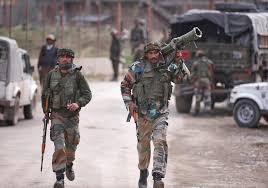When Adil Dar rammed a car stuffed with explosives into a paramilitary convoy in Indian-administered Kashmir last month, I didn’t make much of the news.
I was travelling across northern India at the time. Having been born and brought up amid a conflict that has defined the life of every young Kashmiri for the past three decades it just seemed more of the same: military cordons, gunfights, curfews, blown-up houses, maiming and the death of our friends and acquaintances.
But the magnitude of this attack by Dar, a 22-year-old Kashmiri, crept up on me through numbers and images. It was the worst attack against Indian forces since the armed insurgency erupted in Kashmir in the late 1980s.
At least 40 Indian paramilitary personnel had been killed, setting off a chain of events that almost brought South Asia to the brink of an all-out nuclear war.
I felt heartbroken by the loss of life that had occurred.
The Indian media instantly began to whip up a frenzy against the Kashmiris, doubling down on efforts to demonise an entire people.
The Indian population’s anger was focused against Kashmiri civilians, students and migrant businessmen, who were attacked by mobs. As many as 2000 of them were forced to flee from different Indian cities.
I experienced this frenzy firsthand. A grocer, at first believing that I wasn’t from Kashmir, began a tirade against his Kashmiri customers — a couple of children out to buy potato chips — but soon realising that I wasn’t on his side, embarrassedly changed the topic.
‘I have never felt as threatened’
I have lived in India as a student and travelled across the country throughout my life, but I have never felt as threatened as during this recent visit.
Constantly dehumanised in the Indian media as well as politics, Kashmiris have been undermined and permanently relegated as dispensable other in the Indian consciousness. Even the India’s parliamentary opposition, led by the Indian National Congress party that finds its roots in the anti-colonial struggles of the subcontinent, didn’t even dare to speak a word against this wave of anti-Kashmiri hate-crimes.
Was it for fear of electoral backlash inside mainland India?
After Adil Dar’s attack, rather than asking how such a huge quantity of explosives was able to make its way through one of the most militarised highway in the world, the Indian media blamed the attack squarely on neighbouring Pakistan.
While it is no secret that Islamabad has supported the insurgent groups in Indian-administered Kashmir through weapons supplies and training, India’s political analysts and even many military veterans who have served in Kashmir believe that the present insurgency in the area is almost entirely homegrown and rooted in structural grievances.
The worst tensions in 20 years
According to his parent’s testimony Dar, the suicide bomber, joined the insurgents as a teenager following an insulting confrontation with Indian troops.
Dar was intercepted on his way home one day, questioned and forced to rub his nose on the ground: an act considered to be deeply humiliating in Kashmiri culture.
Looming general elections have left India’s ultranationalist Bharatiya Janata party in a tight spot. It has attempted to appease followers by ordering airstrikes into Pakistani territory.
In retaliation, Pakistan has conducted its own set of airstrikes into Indian-controlled territory and captured a fighter-pilot after shooting down an Indian aircraft that had drifted into Pakistani airspace.
Amid rising tensions, both the countries mobilised their armed forces, leading to the worst tension in 20 years. Diplomats succeeded in persuading the two nuclear-armed nations to back-off. For now.
It is local Kashmiris whose lives were disrupted by this military posturing and brinkmanship. Civilians across the de-facto border that divides Indian and Pakistani-administered Kashmir, suffered the stress of warplanes hovering above and the impending threat of war.
Widespread panic breaks out
As a journalist writing about faraway warzones like Syria, I often came across the testimonies of civilians expressing anguish at sonic booms keeping them and their children awake all night. But now, it felt like war had eerily come home.
Understandably scared, many Kashmiris began hoarding essential supplies like food and fuel, leading to critical shortages. Widespread panic was reinforced through orders from the local government in Indian-administered Kashmir, urging officials to distribute food supplies and keep hospitals ready for any eventuality.
Kashmiris relied on their sense of humour to get them through.
A joke began to float around questioning the sense of hoarding tea and fuel while a nuclear annihilation was on the horizon.
Meanwhile, amid this war hysteria, the crackdown on dissent in Indian-administered Kashmir has noticeably increased. Upwards of 300 people have been arbitrarily detained by Indian forces across the region. The houses of separatist leaders have been raided by India’s counterterrorism service, the powerful and pervasive National Investigation Agency.
Perhaps fearing an embarrassedly low voter turnout during the upcoming regional and national elections in the region, the Indian government recently banned the Jamaat-e-Islami party, Kashmir’s largest socio-religious organisation, which has separatist leanings.
The ban on Jamaat — which runs hundreds of low-cost schools and orphanages across Indian-administered Kashmir — was even opposed by the region’s pro-India political parties which pointed out that the ban would push the organisation underground and reinforce its support.
Some of the Jamat-run schools, its offices as well as houses of many of its workers have been sealed shut.
Deadliest decade
The confrontation between India and Pakistan has slowly de-escalated but people continue to be killed, and while last year was the deadliest in a decade the coming year looks catastrophically bleak.
In the past week 15 people including eight Kashmiri civilians died in shelling and gunfights on the border.
As world attention shifts elsewhere the plight of Kashmiri people remains constant. Our land, our air and our bodies will remain the sites of violent confrontation and electoral bargaining.
Will anyone bat an eye before the next nuclear showdown?




